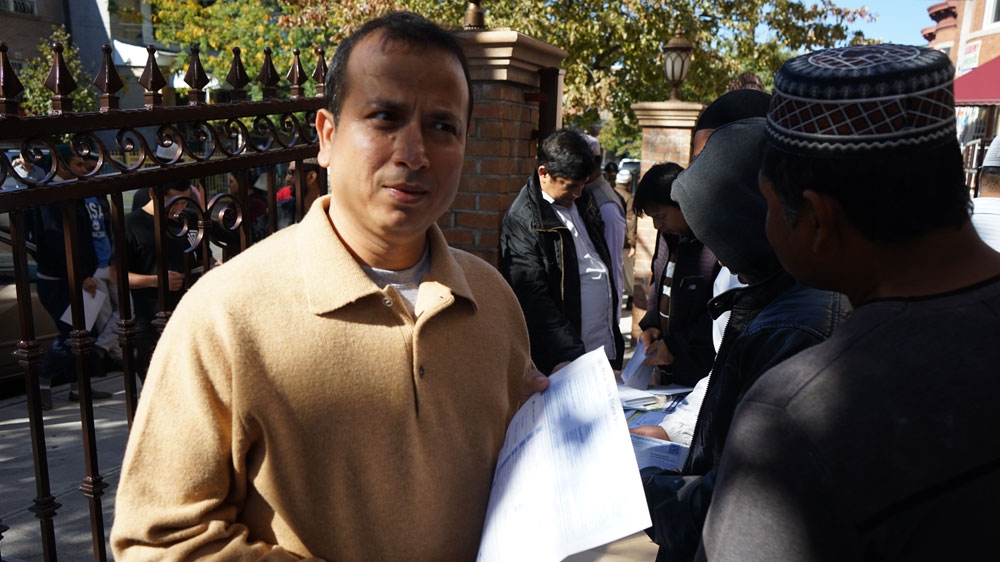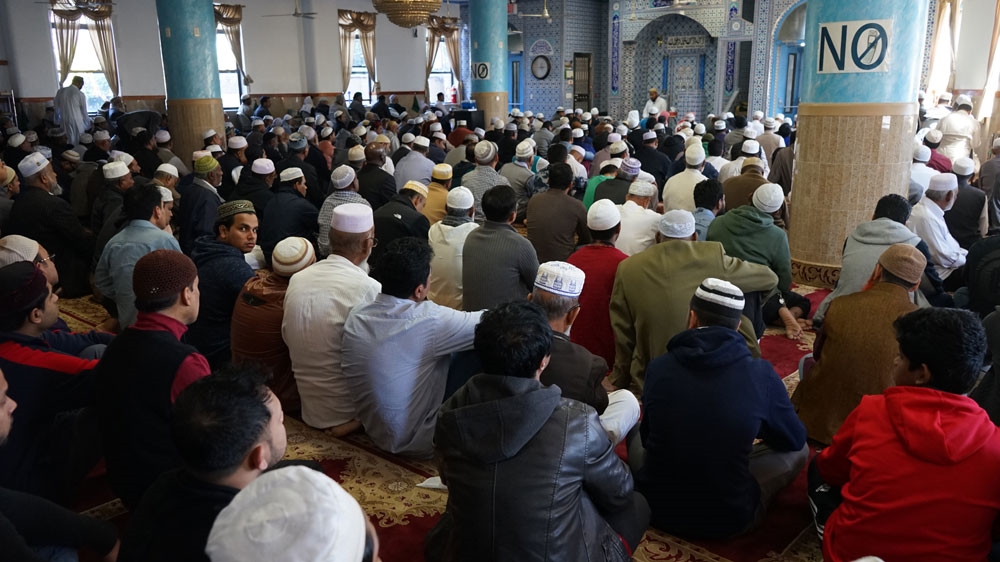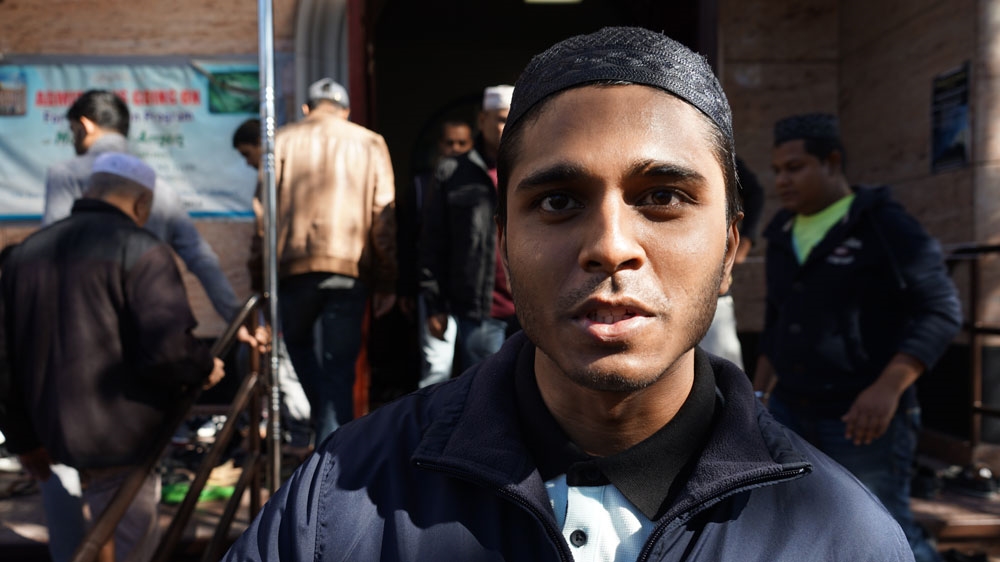Muslim and Arab Americans, despite being only slivers of US electorate, could hurt Republican candidate’s chances.
The blue skies were among the prettiest that a New York autumn could offer, but still a cloud hung over Masjid-al-Aman mosque on Friday, the last day that locals could register to vote in next month’s bitterly contested presidential election.
The community of Bangladeshi immigrants in Ozone Park, Brooklyn, still mourns the killing of an imam and his assistant nearby in August.
The shootings were widely seen as part of a rising tide of anti-Muslim sentiment that has shaken America this election cycle.
After praying, worshippers gathered outside the mosque around a table for registering voters.
Those who understood English helped new arrivals with tricky words in the final hours of a drive to register more Muslim voters in a US election than ever before.
Organisers say they seek more civic engagement, but when pressed admit they are scared by the prospect of a win for Republican candidate Donald Trump, who talks of halting Muslim immigration to the US among a raft of anti-immigrant policies.
Golam Uddin, 46, a Bangladeshi American, has lived in the US for the past 27 years but he plans to vote for the first time on November 8. His choice – Trump’s Democratic rival, Hillary Clinton – is a no-brainer, he told Al Jazeera.
 |
| Golam Uddin plans to vote for the first time on November 8 [James Reinl/Al Jazeera] |
“Trump’s a racist guy. He don’t like Muslims, he stops immigrants, Latinos, everything,” Uddin, a father-of-two who runs subway kiosks, said.
“There are 3.3 million Muslims; everything goes to her. The Democrats are always with us immigrants.”
According to the Council on American Islamic Relations (CAIR), a religious rights group, Muslims are fired up this election cycle – 86 percent of registered Muslim voters plan to cast ballots, with 72 percent backing Clinton against Trump’s 4 percent.
Al Jazeera found no Trump supporters in Ozone Park.
READ MORE: Trump keeps support of Muslim-American Republicans
Worshippers spoke ruefully of the murdered imam and complained of everything from assaults to passers-by kicking the buggies of Muslim toddlers in a wave of Trump-fuelled hostility, they said.
Such scenes are replicated at mosques and community centres across the US this month in advance of voter registration deadlines, which vary by state, in a bid to enrol a million more Muslim voters than in previous elections.
Voter drives are backed by CAIR, a public action committee called Emerge USA and Yalla Vote – a scheme from the Arab American Institute (AAI), a lobby group for an estimated 3.7 million Arab Americans, who comprise Christians, Muslims and others.
Neither Arabs nor Muslims are factored in the US census, but Pew Research Center counted a fast-growing population of 3.3 million Muslims in the US this year – a one percent share of the population that is expected to double by 2050.
 |
| Worshippers at Masjid-al-Aman mosque in Ozone Park, Brooklyn, NYC [James Reinl/Al Jazeera] |
Including blacks, South Asians, Middle Easterners and converts, they form a Democrat-leaning mass, according CAIR’s survey
Almost a third of respondents spoke of experiencing profiling or discrimination this past year.
Neither Arabs nor Muslims pack as big an electoral punch as Latinos, some 17 percent of the population, or blacks [13 percent]. But they cluster in a handful of swing states and their near-total rejection of Trump could hurt him on polling day.
“While our population is not so large, we’re concentrated in some key battleground states. Winning in these places can come down to several thousand votes and in a close-call race, Arab Americans are a swing constituency that could sway the outcome,” Maya Berry, the director of AAI told Al Jazeera.
“There is no path for Trump to the White House without those states right now.”
US presidents are not chosen by popular vote, but through a system that elevates the importance of several competitive states. Muslim and Arab Americans are clustered in such battlegrounds as Florida, Ohio, Michigan, Pennsylvania and Virginia.
Muslim and Arab American voter drives have been concentrated in these areas, which could swing a Trump or Clinton victory. In Florida, Clinton leads polls by less than three percent; in Ohio, her lead is narrower than two points.
READ MORE: Donald Trump caught making lewd comments about women
In Ohio, student Malek Khawam, 23, enrolled more than 100 young voters at Cleveland State University.
“It’s vital for minorities and groups that feel they are underrepresented to use their voice in the political process and not walk away from that process,” Khawam told Al Jazeera.
Of course, Trump may not need any help losing.
The final weeks of campaigning have been dominated by his sex life and his bragging about a predatory treatment of women, pushing him about seven percentage points below Clinton in an average of national polls.
But while such respected pundits as Nate Silver currently give Trump only a 14 percent chance of winning the keys to the Oval Office, others are loath to call an election that barely resembles America’s previous presidential face-offs.
Though Trump’s rhetoric has alienated minorities and women, his stances on immigration and free trade and his promise to “make America great again” resonates with many, including a core of white men, both blue collar and college educated.
Many Muslims rejected his claims that large numbers of Muslims in New Jersey celebrated the 9/11 strikes, or that terror hits on Paris and San Bernardino, California, should be met with bans on Muslims or those from terrorism-afflicted countries visiting the US.
The billionaire famously feuded with Khizr and Ghazala Khan, the parents of soldier Humayun Khan, who was killed in Iraq in 2004.
He has spoken of Syrian refugees as a potential “Trojan horse” through which fighters could enter the US.
READ MORE: A Muslim ghost is haunting America
During the second presidential debate, when asked by a Muslim woman how he would help stop her being labelled a “threat to the country”, Trump called Islamophobia “a shame” but put the onus on Muslim Americans to tackle extremism within their faith.
This puts off many, but not all Muslims. Mosque-goer Amin Sattar, 20, will vote for the first time next month after getting citizenship for the “best country in the world” four years ago.
 |
| Amin Sattar, a Bangladeshi American, is yet to decide who to vote [James Reinl/Al Jazeera] |
Trump is a “little mental” but Clinton underwhelms too, he said.
“My ears are still opening,” Sattar, a student, told Al Jazeera. “My final decision will be on November 8.”
Both candidates are unpopular. While Clinton’s trustworthiness is repeatedly questioned, among Muslims and Arabs, her hawkish track record in backing US interventions in Iraq and Libya is perhaps more troubling.
Earlier this month, Clinton’s campaign team was in Dearborn, Michigan, one of America’s biggest Muslim populations. There, Clinton’s surrogate and former rival in the Democratic primaries, Bernie Sanders, bashed Trump as a tax-dodger.
Many Arab and Muslim voters favoured Sanders, a left-leaning Jewish septuagenarian who calls for a fairer treatment of Palestinians, over Clinton in the primaries.
They helped him score a surprise victory against her in Michigan in March.
For others, it is just a matter of business.
“This is an election between freedom and socialism at the same time. We are Muslims, but we are Americans as well,” Sajid Tarar, a Pakistani-American businessman who spoke for Trump at his convention in Cleveland in July, told Al Jazeera.
For Tarar, Trump will tackle home-grown fighters and stand up for the conservative values underpinning Islam. Democrats, he said, promote such vices as “same-sex marriage, legalising cannabis and socialism”.
But the numbers show Tarar is a relic. Muslims and Arabs used to be split between Republicans and Democrats. The Iraq war saw some shift left, but Trump’s anti-Muslim railings have pushed many more into the Democratic fold.
It may come back to bite him.
by James Reinl
James Reinl is a journalist and world affairs analyst who has reported from more than 30 countries and won awards for covering Haiti’s earthquake, Sri Lanka’s civil war and human rights abuses in Iran.
































